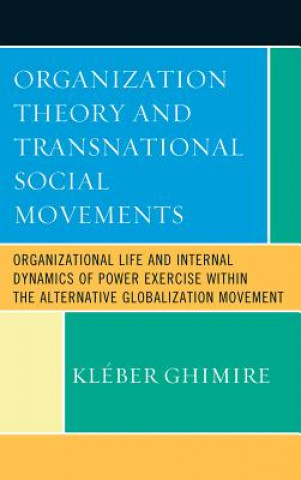
Kód: 04903726
Organization Theory and Transnational Social Movements
Autor Kleber Bertrand Ghimire
Placing it within the theoretical perspectives and debates in Organizational Theory (OT), this book explores the organizational design and internal functioning of a rather emblematic and widely acclaimed transnational social organ ... celý popis
- Jazyk:
 Angličtina
Angličtina - Väzba: Pevná
- Počet strán: 178
Nakladateľ: Lexington Books, 2011
- Viac informácií o knihe

147.85 €

Skladom u dodávateľa v malom množstve
Odosielame za 10 - 14 dní
Potrebujete viac kusov?Ak máte záujem o viac kusov, preverte, prosím, najprv dostupnosť titulu na našej zákazníckej podpore.
Pridať medzi želanie
Mohlo by sa vám tiež páčiť
-

Quantum Electrodynamics
93.66 € -

Oxford Handbook of Business Ethics
81.68 € -

Psychotherapy with Sexually Abused Boys
121.36 € -

Dan Ge Performance
30.64 € -

No Statue on the Courthouse Lawn
21.10 € -4 % -

Mastering Money: Creating the Money You Want, From the Inside, Out
10.44 € -

Nomad Trader
23.84 €
Darčekový poukaz: Radosť zaručená
- Darujte poukaz v ľubovoľnej hodnote, a my sa postaráme o zvyšok.
- Poukaz sa vzťahuje na všetky produkty v našej ponuke.
- Elektronický poukaz si vytlačíte z e-mailu a môžete ho ihneď darovať.
- Platnosť poukazu je 12 mesiacov od dátumu vystavenia.
Viac informácií o knihe Organization Theory and Transnational Social Movements
Nákupom získate 369 bodov
 Anotácia knihy
Anotácia knihy
Placing it within the theoretical perspectives and debates in Organizational Theory (OT), this book explores the organizational design and internal functioning of a rather emblematic and widely acclaimed transnational social organization: the alternative globalization movement (previously anti-globalization movement). The issue of power in particular remains the central feature of the book. Based on a detailed study of two of the movement's essential constituents (transnational campaigns and the World Social Forum), the book examines the complexity in which certain forms of internal relations or mechanisms of power emerge. In other words, how is the organizational hierarchy conceived and how are important responsibilities executed? What are the principal modes of authority and control? What are the priorities and motives of the leading individuals and groups within the movement? Furthermore, what makes certain echelons, groups, or individuals wield more influence and authority than others, and also justify their legitimacy through diverse means? These questions are especially valid owing to the movement's proper interpretation of power which considers the concentration of power as totally unacceptable. The movement draws lessons from the history of social changes to suggest that political parties and labour movements tended to give rise to the seizure of power by a few, a heavy bureaucracy, and the lack of transparency. Logically, then, a new organizational vision should emerge, avoiding hierarchies and encouraging a more diffused process of power sharing. However, an informal manner of functioning has instead created many ambiguities, with new sets of interests and power relations gradually becoming manifest within the movement. All carefully considered, the book draws three principal conclusions: first, an informal organization structure does not mean that there is an absence of power; second, the exercise of power takes place while denying it; and third, there is seemingly a lack of internal resistanc
 Parametre knihy
Parametre knihy
Zaradenie knihy Knihy po anglicky Society & social sciences Society & culture: general Social issues & processes
147.85 €
- Celý názov: Organization Theory and Transnational Social Movements
- Podnázov: Organizational Life and Internal Dynamics of Power Exercise within the Alternative Globalization Movement
- Autor: Kleber Bertrand Ghimire
- Jazyk:
 Angličtina
Angličtina - Väzba: Pevná
- Počet strán: 178
- EAN: 9780739165577
- ISBN: 0739165577
- ID: 04903726
- Nakladateľ: Lexington Books
- Hmotnosť: 422 g
- Rozmery: 235 × 156 × 17 mm
- Dátum vydania: 08. April 2011
Obľúbené z iného súdka
-

The Second Sex
7.20 € -24 % -

White Tears Brown Scars
10.14 € -24 % -

When Helping Hurts
13.79 € -20 % -

The Beauty Myth
6.08 € -24 % -

Violence and the Sacred
40.48 € -

Wolf Nation
32.87 € -13 % -

Good Immigrant
13.39 € -

Stuart
13.49 € -14 % -

Population Wars
16.33 € -18 % -

The Lucifer Effect
16.02 € -20 % -

Superforecasting
10.85 € -24 % -

Sensate Focus in Sex Therapy
40.89 € -

Pleasure Activism
17.04 € -19 % -

Drama Of Being A Child
11.05 € -23 % -

Alcoholics Anonymous Big Book
24.85 € -

Vulture
17.34 € -13 % -

Regarding the Pain of Others
12.17 € -23 % -

Rational Optimist
16.43 € -22 % -

Poor Economics
11.15 € -22 % -

Violence
11.66 € -19 % -

Psychopath Free
20.29 € -4 % -

Shock Doctrine
15.11 € -21 % -

The Divide
11.97 € -16 % -

Silently Seduced
12.78 € -19 % -

The Feminine Mystique
10.04 € -22 % -

Toxic Parents
14.30 € -23 % -

Soft Power
14.50 € -20 % -

Third Wave
8.62 € -24 % -

Posthuman Feminism
21.40 € -

No Logo
12.98 € -9 % -

Courage To Heal Workbook
25.87 € -8 % -

Illness as Metaphor and AIDS and Its Metaphors
14.30 € -23 % -

Down and Out in Paris and London
10.04 € -22 % -

Dopesick
10.14 € -24 % -

Presence
14.91 € -22 % -

Facing the Shadow
32.97 € -18 % -

Last Days at Hot Slit - The Radical Feminism of Andrea Dworkin
18.87 € -22 % -

A Room of One's Own
8.31 € -24 % -

Future Shock
9.02 € -21 % -

Problem that Has No Name
2.53 € -23 % -

Your Silence Will Not Protect You
15.31 € -23 % -

Social Animal
14.30 € -23 % -

Attention Merchants
12.27 € -17 % -

Who Cooked Adam Smith's Dinner?
12.17 € -23 % -

Stiff Upper Lip
12.17 € -23 % -

Power Elite
18.66 € -19 % -

Eternal Treblinka
22.82 € -

Critical Race Theory (Third Edition)
20.19 € -6 % -

Go Ask Alice
10.04 € -22 %
Osobný odber Bratislava a 2642 dalších
Copyright ©2008-24 najlacnejsie-knihy.sk Všetky práva vyhradenéSúkromieCookies


 21 miliónov titulov
21 miliónov titulov Vrátenie do mesiaca
Vrátenie do mesiaca 02/210 210 99 (8-15.30h)
02/210 210 99 (8-15.30h)